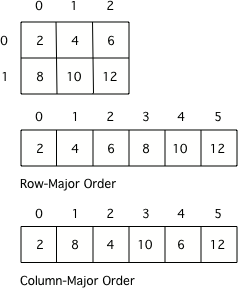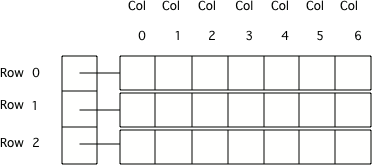📓4.11: 2D Array Creation & Access
Table of Contents
📖 This page is a condensed version of CSAwesome Topic 4.11
✴✴✴ NEW UNIT/SECTION! ✴✴✴
Create a blank Java program to take your class notes in for the next few lessons.
Click on the collapsed heading below for GitHub instructions ⤵
📓 NOTES PROGRAM SETUP INSTRUCTIONS
- Go to the public template repository for our class: BWL-CS Java Template
- Click the button above the list of files then select
Create a new repository - Specify the repository name:
CS2-Unit4PartC-Notes - For the description, write:
2D Array data collections - Click
Now you have your own personal copy of this starter code that you can always access under the
Your repositoriessection of GitHub! 📂 - Now on your repository, click and select the
Codespacestab - Click
Create Codespace on mainand wait for the environment to load, then you’re ready to code! - 📝 Take notes in this Codespace during class, writing code & comments along with the instructor.
🛑 When class ends, don’t forget to SAVE YOUR WORK! Codespaces are TEMPORARY editing environments, so you need to COMMIT changes properly in order to update the main repository for your program.
There are multiple steps to saving in GitHub Codespaces:
- Navigate to the
Source Controlmenu on the LEFT sidebar - Click the button on the LEFT menu
- Type a brief commit message at the top of the file that opens, for example:
updated Main.java - Click the small
✔️checkmark in the TOP RIGHT corner - Click the button on the LEFT menu
- Finally you can close your Codespace!
Two-Dimensional (2D) Arrays
We have only worked with one-dimensional arrays so far, which have a single row of elements. But in the real world, data is often represented in a two-dimensional table with rows and columns. Programming languages can also represent arrays this way with multiple dimensions. A two-dimensional (2D) array has rows and columns.
A 2D array in Java is actually an array of arrays!
Arrays in Java can store many items of the same type. You can even store items in two-dimensional (2D) arrays which are arrays that have both rows and columns. A row has horizontal elements. A column has vertical elements. In the picture below there are 3 rows of lockers and 6 columns.

Two dimensional arrays are especially useful when the data is naturally organized in rows and columns like in a spreadsheet, bingo, battleship, theater seats, classroom seats, or a picture. In battleship, letters map to the rows (A is the first row, B is the second row, and so on) and the column indices start with 1.
Array Storage
Many programming languages actually store two-dimensional array data in nested one-dimensional arrays. The typical way to do this is to store all the data for the first row, with each spot referring to a column, followed by all the data for the second row, and so on. This is called row-major order.
Some languages store all the data for the first column followed by all the data for the second column and so on. This called column-major order.

Java actually stores a two-dimensional array as an array of arrays. Each element of the outer array has a reference to each inner array.
The outer array can be thought of as the rows and the inner arrays as the columns.

The picture above shows a 2D array that has 3 rows and 7 columns. Notice that the array indices start at
0and end at thelength - 1.
Declaring 2D Arrays
To declare a 2D array, specify the type of elements that will be stored in the array, then double brackets ([][]) to show that it is a 2D array of that type, then at least one space, and then a name for the array.
int[][] ticketInfo;
String[][] seatingChart;
Note that the declarations above just name the variable and say what type of array it will reference. The declarations do not create the array. Arrays are objects in Java, so any variable that declares an array holds a reference to an object. If the array hasn’t been created yet and you try to print the value of the variable, it will print
null(meaning it doesn’t reference any object yet).
To create an array use the new keyword, followed by a space, then the type, and then the number of rows in square brackets followed by the number of columns in square brackets, like this new int[numRows][numCols].
ticketInfo = new int[2][3];
seatingChart = new String[3][2];
The code above creates a 2D array with 2 rows and 3 columns named
ticketInfoand a 2D array with 3 rows and 2 columns namedseatingChart.
The total number of elements in a 2D array is the number of rows times the number of columns.
Set Value(s) in a 2D Array
When arrays are created, their contents are automatically initialized to 0 for numeric types, null for object references, and false for type boolean.
To explicitly set a value in a 2D array, you can use assignment statements with the name of the array followed by the row index in square brackets followed by the column index in square brackets, and then an = followed by a value:
// Initialize the 2D array
int[][] data = new int[2][3];
// Set value of the first item
data[0][0] = 15;
Initializer Lists for 2D Arrays
You can also initialize (set) the values for the array when you first create it. In this case you don’t need to specify the size of the array, it will be determined from the values you give.
The code below uses an initializer list to create a value-filled array called ticketInfo with 2 rows and 3 columns. It also creates an array called seatingInfo with 3 rows and 2 columns.
int[][] ticketInfo = { {25,20,25}, {25,20,25} };
String[][] seatingInfo = { {"Jamal", "Maria"}, {"Jake", "Suzy"}, {"Emma", "Luke"} };
💬 DISCUSS: What is the value at
seatingInfo[2][1]after the code above executes?
Get a Value from a 2D Array
To get the value in a 2D array give the name of the array followed by the row and column indices in square brackets.
int[][] ticketInfo = { {25,20,25}, {25,20,25} };
String[][] seatingInfo = { {"Jamal", "Maria"}, {"Jake", "Suzy"}, {"Emma", "Luke"} };
int value = ticketInfo[1][0];
String name = seatingInfo[0][1];
The code above will get the
intvalue at row index 1 and column index 0 fromticketInfo. It will also get theStringvalue at row index 0 and column index 1 fromseatingChart.
Row and Column length
Arrays know their length (how many elements they can store). The length is a public read-only attribute for array objects. The number of rows contained in a 2D array can be accessed through the array name and the length attribute: arrayName.length. The number of columns contained in a 2D array can be accessed through the length attribute of one of the rows, for example arrayName[0].length, which gives a single array that is a row of a 2D array using the 2D array name and a single set of square brackets containing the row index.
ticketInfo.length // returns the number of rows
ticketInfo[0].length // returns the number of columns
Note that length is an attribute and not a method, so you don’t add parentheses after length. However, if you use parentheses after length during the exam, you won’t lose any points. Since for the AP CSA exam all two-dimensional arrays are rectangular arrays (arrays that have the same number of columns in each row) you can just use the length of the first inner array as the number of columns as shown by ticketInfo[0].length.
- The valid row index values for a 2D array are
0through one less than the number of rows or the length of the array, inclusive. - The valid column index values for a 2D array are
0through one less than the number of columns or the length of any given row of the array, inclusive.
For example, given a 2D array named
values, the number of rows isvalues.lengthand the number of columns isvalues[0].length. Using an index value outside of these ranges will result in anArrayIndexOutOfBoundsException.
💻 In-Class Activity: ASCII Art
⭐️ Summary
-
(AP 4.11.A.1) A 2D array is stored as an array of arrays. Therefore, the way 2D arrays are created and indexed is similar to 1D array objects. The size of a 2D array is established at the time of creation and cannot be changed. 2D arrays can store either primitive data or object reference data. Nonrectangular 2D array objects (with varying column length for each row) are outside the scope of the AP Computer Science A course and exam.
-
2D arrays are declared and created with the following syntax:
datatype[][] variableName = new datatype[numberRows][numberCols]; -
(AP 4.11.A.2) When a 2D array is created using the keyword
new, all of its elements are initialized to the default values for the element data type. The default value forintis0, fordoubleis0.0, forbooleanisfalse, and for a reference type isnull. -
(AP 4.11.A.3) The initializer list used to create and initialize a 2D array consists of initializer lists that represent 1D arrays; for example,
int[][] arr2D = { {1, 2, 3}, {4, 5, 6} };. -
(AP 4.11.A.4) The square brackets
[row][col]are used to access and modify an element in a 2D array. For the purposes of the AP exam, when accessing the element atarr[first][second], thefirstindex is used for rows, thesecondindex is used for columns. -
Row-major order refers to an ordering of 2D array elements where traversal occurs across each row, while column-major order traversal occurs down each column.
- (AP 4.11.A.5) A single array that is a row of a 2D array can be accessed using the 2D array name and a single set of square brackets containing the row index.
- (AP 4.11.A.6) The number of rows contained in a 2D array can be accessed through the
lengthattribute. The valid row index values for a 2D array are0through one less than the number of rows or the length of the array, inclusive. The number of columns contained in a 2D array can be accessed through thelengthattribute of one of the rows. The valid column index values for a 2D array are0through one less than the number of columns or the length of any given row of the array, inclusive. For example, given a 2D array namedvalues, the number of rows isvalues.lengthand the number of columns isvalues[0].length. Using an index value outside of these ranges will result in anArrayIndexOutOfBoundsException`.
Acknowledgement
Content on this page is adapted from Runestone Academy - Barb Ericson, Beryl Hoffman, Peter Seibel.